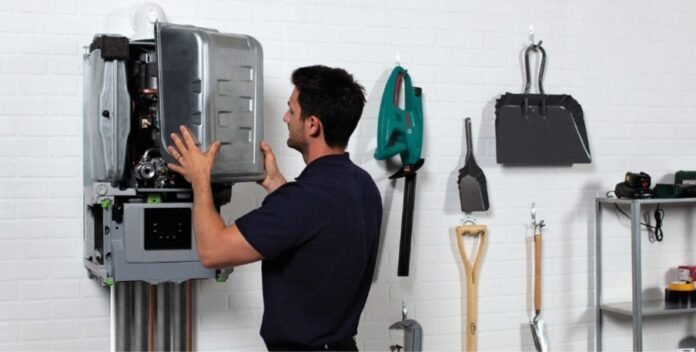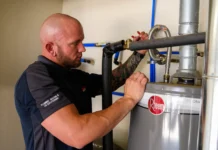Last Updated on January 10, 2026 by Rida Gul
Winter is here, and so are the frequent boiler breakdowns. The chilly mornings and evenings make us heavily rely on our boilers, and a sudden malfunction can be a nightmare. The last thing anyone wants is to be left without heating or hot water in freezing temperatures. Don’t worry, though, as we have gathered some expert advice on how to fix your boiler breakdowns and keep them in top condition throughout the winter season. Read on to learn more.
Table of Contents
Know Your Boiler’s Warning Signs
Nobody likes to wake up to a cold shower or come home to a chilly house. But before your boiler breaks down completely, it usually gives you some warning signs. These could include strange noises, leaks, low pressure, or a sudden increase in energy bills. So don’t ignore them! Regular inspections can help you spot these warning signs early and take preventive measures before it’s too late.
Another thing to keep in mind is that different boilers can have different warning signs. For instance, a gas boiler may give off a rotten egg smell, whilst an oil boiler may produce black soot. If you notice any unusual smells or signs of soot, it’s important to call a heating engineer immediately.
In addition, don’t forget to check your radiators regularly. If they’re not heating up evenly or not heating at all, it could be a sign of a bigger problem. Low water pressure, airlocks, or a build-up of sludge can all cause issues with your radiators. So make sure to bleed them regularly and call a professional if the problem persists.
Remember, being aware of the warning signs and acting promptly can save you a lot of hassle and money in the long run. So keep an eye out for anything unusual and don’t hesitate to call for help if you need it.
Regular Boiler Servicing and Maintenance
Regular boiler servicing and maintenance are crucial to ensure your boiler runs efficiently and prevent breakdowns. It’s recommended to service your boiler at least once a year, preferably before the winter season begins. During a service, a professional heating engineer will inspect and clean the boiler components, replace any faulty parts, and make sure your boiler runs efficiently. They’ll also check the boiler’s emissions to make sure it’s not releasing any harmful gases into the environment.
In addition to regular servicing, make sure to perform regular maintenance tasks, such as bleeding the radiators, checking the pressure, and clearing any debris around the boiler. Neglecting these tasks can lead to reduced efficiency and increase the likelihood of breakdowns.
Remember, regular boiler servicing and maintenance can save you money in the long run by extending the life of your boiler and reducing energy bills. Plus, it can give you peace of mind, knowing that your boiler is running safely and efficiently. So don’t skip your annual service and make sure to keep up with regular maintenance tasks to keep your boiler in top condition.
Investing in boiler breakdown cover ensures 24/7 assistance, covering repairs and providing peace of mind during unexpected breakdowns. Choose a policy wisely, considering response times and coverage specifics for comprehensive coverage.
Boiler Fixes: What’s Safe to Try?
Feeling handy and want to try fixing your boiler yourself? Before you grab your tools, make sure you know what’s safe to try. Some minor boiler problems can be fixed with simple DIY solutions, such as resetting the boiler or topping up the pressure. However, it’s important to leave more complex issues to the professionals. Attempting to fix the internal components or tampering with the gas supply is dangerous and should be avoided at all costs.
If you’re unsure about the DIY fixes or notice any significant problems, it’s best to call a professional heating engineer. They have the expertise and tools to diagnose and fix the issue quickly and safely. Plus, attempting to fix a complicated problem yourself can lead to further damage, costing you more money in repairs.
Remember, safety always comes first when it comes to fixing your boiler. Stick to the simple DIY fixes and leave the complex issues to the professionals. With the right approach and expert help, you can get your boiler up and running safely and efficiently.
Knowing When to Call a Professional
Even if you’re a do it yourself enthusiast, there are times when calling a professional heating engineer is the best course of action. If you’re unsure about a problem or notice significant issues, it’s always better to err on the side of caution. Attempting to fix complex problems yourself can lead to further damage and cost you more in repairs.
But how do you know when to call a professional? If you notice any unusual smells or signs of soot, it’s important to call a heating engineer immediately. Additionally, if your radiators are not heating up evenly or at all, it could be a sign of a bigger problem. Low water pressure, airlocks, or a build-up of sludge can all cause issues with your radiators.
Another sign that you need to call a professional is if your boiler is making strange noises or giving off unusual smells. These could indicate a problem with the internal components or gas supply, which can be dangerous if left unchecked. If your boiler displays error codes, it’s best to consult your boiler manual or the manufacturer’s website and call a professional if you’re unsure about the problem.
Remember, safety always comes first when it comes to fixing your boiler. Don’t hesitate to call a professional heating engineer if you notice any significant problems or are unsure about the DIY fixes. They have the expertise and tools to diagnose and fix the issue quickly and safely, ensuring your boiler runs smoothly and efficiently.
Understanding Common Boiler Fault Codes
If your boiler displays an error code, it can help you identify the problem quickly. Understanding common boiler fault codes can help you diagnose the issue before calling a professional. For example, code E133 usually indicates an issue with the gas supply, whilst code E28 often indicates a lack of circulation. However, it’s essential to consult your boiler manual or the manufacturer’s website to learn more about the fault codes specific to your boiler.
It’s worth noting that some error codes are more serious than others. For instance, codes related to gas supply or ignition issues require immediate attention from a professional heating engineer. On the other hand, some codes, such as low water pressure or airlocks, can be fixed with simple do it yourself solutions.
Bear in mind that ignoring fault codes can lead to further damage and cost you more in repairs. So, if you notice any unusual error codes on your boiler display, it’s best to take action and call a professional if needed. By understanding common fault codes and acting promptly, you can keep your boiler running efficiently and save yourself from more significant issues in the long run.
The Environmental Impact of Your Boiler
Boilers can have a significant impact on the environment, contributing to carbon emissions and climate change. But did you know that upgrading to a new, energy-efficient boiler can significantly reduce your carbon footprint and save you money on energy bills in the long run? That’s right! Investing in an eco-friendly boiler not only benefits the environment but also benefits your wallet.
Energy-efficient boilers use less fuel to generate the same amount of heat as older models, meaning they produce fewer carbon emissions and reduce your energy bills. Plus, some newer models even have features like smart thermostats and weather compensation, which further improve efficiency and reduce energy waste.
But if you’re not ready to invest in a new boiler just yet, there are other ways to reduce your boiler’s environmental impact. Consider using renewable energy sources, such as solar panels or ground-source heat pumps, to power your boiler. These options are eco-friendly, and sustainable, and can even provide long-term cost savings.
In summary, the environmental impact of your boiler should not be ignored. Investing in an energy-efficient boiler or renewable energy source can significantly reduce your carbon footprint and save you money on energy bills in the long run. So, let’s make our homes more eco-friendly and reduce our impact on the environment, one boiler at a time!
The Need for Home Emergency Cover
Boiler breakdowns can be a major inconvenience, especially during the winter months. That’s why having home emergency cover is a smart investment. With this type of insurance, you’ll have access to 24/7 help in case of a boiler breakdown. This means you won’t have to worry about finding a heating engineer on your own or paying for expensive repairs out of pocket.
Home emergency cover policies can cover the cost of repairs, parts, and labour, and some may even provide temporary heating and hot water solutions while your boiler is being fixed. This means you can rest assured that your home will remain warm and comfortable, even if your boiler is out of commission for a few days.
However not all home emergency cover policies are created equal, so it’s important to do your research and choose a policy that fits your needs. Look for policies that offer quick response times, reliable service, and competitive pricing. It’s also important to read the small print and understand what’s covered and what’s not.
Overall, having a home emergency cover can provide peace of mind and cover you from unexpected boiler breakdowns. So, consider investing in this type of insurance to ensure that you and your family stay warm and comfortable, no matter what the winter weather brings.
Conclusion
In a nutshell, keeping your boiler in good condition is essential to ensure a warm and comfortable winter season. By understanding the warning signs, performing regular maintenance, and knowing when to call a professional, you can prevent breakdowns and save yourself from costly repairs.
Remember, your boiler is not just a heating system but also has a significant impact on the environment. Investing in an eco-friendly boiler or renewable energy sources can reduce your carbon footprint and save you money in the long run.
Apart from that if you want to know about “How to Style a Vintage Inspired” then please visit our “Home Improvement” Category.



























